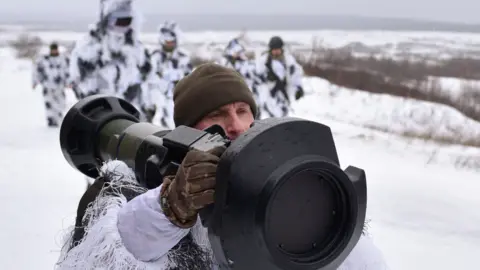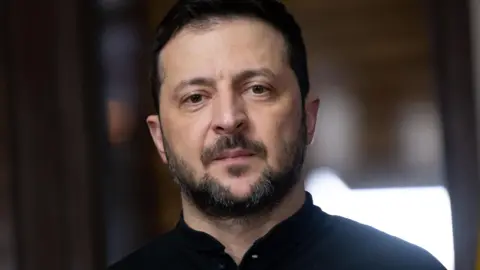'Army of Europe' needed to challenge Russia, says Zelensky
 EPA
EPAUkraine's President Volodymyr Zelensky has called for the creation of an "army of Europe" amid rising concern the US may no longer come to the continent's aid.
Speaking at the Munich Security Conference, he said US Vice-President JD Vance had made it clear the old relationship between Europe and America was "ending" and the continent "needs to adjust to that".
He also said Ukraine would "never accept deals made behind our backs without our involvement" after Donald Trump and Vladimir Putin agreed to start peace talks.
On Saturday, the US Secretary of State Marco Rubio held a phone call with Russia's foreign minister "building on" Wednesday's call between Trump and Putin.
Russia's foreign ministry said Saturday's call had been made "at the request of the US side". The statement did not give any further details on Ukraine but said both sides had "reaffirmed commitment to restoring a ... dialogue" between the two countries.
Trump's call with the Russian president earlier this week broke nearly three years of silence between Washington and Moscow.
Earlier on Saturday, Trump's special envoy to Ukraine also said Europe would be consulted but not take part in talks between the US and Russia, if and when they happen.
In remarks likely to raise concern in Ukraine and among European allies, Keith Kellogg said previous negotiations had failed because too many parties had been involved.
"It may be like chalk on the blackboard, it may grate a little bit, but I am telling you something that is really quite honest," he said on Saturday.
Zelensky also said that he had blocked a Trump-led deal that would have given the US access to vast amounts of Ukrainian natural resources because it lacked "security guarantees" for Kyiv and "does not protect us".
Trump has pushed for access to rare minerals in Ukraine in return for aid, or even as compensation for the support the US has already provided.
Earlier this week, US Defence Secretary Pete Hegseth said Russia's full-scale invasion of Ukraine was a "factory reset" for Nato which signalled the alliance needed to be "robust", "strong" and "real".
On Saturday, Zelensky said: "Let's be honest. Now we can't rule out the possibility that America might say no to Europe on an issue that threatens it.
"Many, many leaders have talked about Europe that needs its own military - an army of Europe."
The concept of a European army has been proposed by other leaders, including France's Emmanuel Macron who has long backed the bloc's own military to reduce its reliance on the US.
The idea was quickly rebuffed by the EU foreign policy chief Kaja Kallas.
Zelensky said: "A few days ago, President Trump told me about his conversation with Putin. Not once did he mention that America needs Europe at the table - that says a lot.
"The old days are over when America supported Europe just because it always had."
As Russia's full-scale invasion of Ukraine nears its three-year anniversary, Trump and Hegseth have both said it is unlikely that Ukraine will join Nato.
The US defence secretary also said a return to Ukraine's pre-2014 borders was unrealistic.
Zelensky said he would "not take Nato membership for Ukraine off the table".
 EPA
EPATrump had a phone call with Putin last week where they discussed peace talks regarding Ukraine, apparently sidelining key allies.
Zelensky said that, as well as Ukraine, Europe "should have a seat at the table when decisions about Europe are being made".
The US president later said that he and Putin planned to meet in Saudi Arabia, and wrote on social media that the two had invited each other to their respective capitals.
No date has been set for Trump's visit to Moscow.
On Ukraine's involvement in talks, Kremlin spokesman Dmitry Peskov said last week that Kyiv "will of course one way or another be taking part in the negotiations".
Germany's chancellor, Olaf Scholz, said his country would never support a dictated peace.
Poland's Prime Minister Donald Tusk said Europe needs its own plan on Ukraine, or "other global players will decide about our future".
